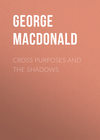Czytaj książkę: «The poetical works of George MacDonald in two volumes — Volume 1», strona 18
Czcionka:
VI.
THE WOMAN WHOM SATAN HAD BOUND
For years eighteen she, patient soul,
Her eyes had graveward sent;
Her earthly life was lapt in dole,
She was so bowed and bent.
What words! To her? Who can be near?
What tenderness of hands!
Oh! is it strength, or fancy mere?
New hope, or breaking bands?
The pent life rushes swift along
Channels it used to know;
Up, up, amid the wondering throng,
She rises firm and slow—
To bend again in grateful awe—
For will is power at length—
In homage to the living Law
Who gives her back her strength.
Uplifter of the down-bent head!
Unbinder of the bound!
Who seest all the burdened
Who only see the ground!
Although they see thee not, nor cry,
Thou watchest for the hour
To lift the forward-beaming eye,
To wake the slumbering power!
Thy hand will wipe the stains of time
From off the withered face;
Upraise thy bowed old men, in prime
Of youthful manhood's grace!
Like summer days from winter's tomb,
Shall rise thy women fair;
Gray Death, a shadow, not a doom,
Lo, is not anywhere!
All ills of life shall melt away
As melts a cureless woe,
When, by the dawning of the day
Surprised, the dream must go.
I think thou, Lord, wilt heal me too,
Whate'er the needful cure;
The great best only thou wilt do,
And hoping I endure.
VII.
THE WOMAN WHO CAME BEHIND HIM IN THE CROWD
Near him she stole, rank after rank;
She feared approach too loud;
She touched his garment's hem, and shrank
Back in the sheltering crowd.
A shame-faced gladness thrills her frame:
Her twelve years' fainting prayer
Is heard at last! she is the same
As other women there!
She hears his voice. He looks about.
Ah! is it kind or good
To drag her secret sorrow out
Before that multitude?
The eyes of men she dares not meet—
On her they straight must fall!—
Forward she sped, and at his feet
Fell down, and told him all.
To the one refuge she hath flown,
The Godhead's burning flame!
Of all earth's women she alone
Hears there the tenderest name:
"Daughter," he said, "be of good cheer;
Thy faith hath made thee whole:"
With plenteous love, not healing mere,
He comforteth her soul.
VIII.
THE WIDOW WITH THE TWO MITES
Here much and little shift and change,
With scale of need and time;
There more and less have meanings strange,
Which the world cannot rime.
Sickness may be more hale than health,
And service kingdom high;
Yea, poverty be bounty's wealth,
To give like God thereby.
Bring forth your riches; let them go,
Nor mourn the lost control;
For if ye hoard them, surely so
Their rust will reach your soul.
Cast in your coins, for God delights
When from wide hands they fall;
But here is one who brings two mites,
And thus gives more than all.
I think she did not hear the praise—
Went home content with need;
Walked in her old poor generous ways,
Nor knew her heavenly meed.
IX.
THE WOMEN WHO MINISTERED UNTO HIM
Enough he labours for his hire;
Yea, nought can pay his pain;
But powers that wear and waste and tire,
Need help to toil again.
They give him freely all they can,
They give him clothes and food;
In this rejoicing, that the man
Is not ashamed they should.
High love takes form in lowly thing;
He knows the offering such;
To them 'tis little that they bring,
To him 'tis very much.
X.
PILATE'S WIFE
Why came in dreams the low-born man
Between thee and thy rest?
In vain thy whispered message ran,
Though justice was its quest!
Did some young ignorant angel dare—
Not knowing what must be,
Or blind with agony of care—
To fly for help to thee?
I know not. Rather I believe,
Thou, nobler than thy spouse,
His rumoured grandeur didst receive,
And sit with pondering brows,
Until thy maidens' gathered tale
With possible marvel teems:
Thou sleepest, and the prisoner pale
Returneth in thy dreams.
Well mightst thou suffer things not few
For his sake all the night!
In pale eclipse he suffers, who
Is of the world the light.
Precious it were to know thy dream
Of such a one as he!
Perhaps of him we, waking, deem
As poor a verity.
XI.
THE WOMAN OF SAMARIA
In the hot sun, for water cool
She walked in listless mood:
When back she ran, her pitcher full
Forgot behind her stood.
Like one who followed straying sheep,
A weary man she saw,
Who sat upon the well so deep,
And nothing had to draw.
"Give me to drink," he said. Her hand
Was ready with reply;
From out the old well of the land
She drew him plenteously.
He spake as never man before;
She stands with open ears;
He spake of holy days in store,
Laid bare the vanished years.
She cannot still her throbbing heart,
She hurries to the town,
And cries aloud in street and mart,
"The Lord is here: come down."
Her life before was strange and sad,
A very dreary sound:
Ah, let it go—or good or bad:
She has the Master found!
XII.
MARY MAGDALENE
With wandering eyes and aimless zeal,
She hither, thither, goes;
Her speech, her motions, all reveal
A mind without repose.
She climbs the hills, she haunts the sea,
By madness tortured, driven;
One hour's forgetfulness would be
A gift from very heaven!
She slumbers into new distress;
The night is worse than day:
Exulting in her helplessness,
Hell's dogs yet louder bay.
The demons blast her to and fro;
She has no quiet place,
Enough a woman still, to know
A haunting dim disgrace.
A human touch! a pang of death!
And in a low delight
Thou liest, waiting for new breath.
For morning out of night.
Thou risest up: the earth is fair,
The wind is cool; thou art free!
Is it a dream of hell's despair
Dissolves in ecstasy?
That man did touch thee! Eyes divine
Make sunrise in thy soul;
Thou seëst love in order shine:—
His health hath made thee whole!
Thou, sharing in the awful doom,
Didst help thy Lord to die;
Then, weeping o'er his empty tomb,
Didst hear him Mary cry.
He stands in haste; he cannot stop;
Home to his God he fares:
"Go tell my brothers I go up
To my Father, mine and theirs."
Run, Mary! lift thy heavenly voice;
Cry, cry, and heed not how;
Make all the new-risen world rejoice—
Its first apostle thou!
What if old tales of thee have lied,
Or truth have told, thou art
All-safe with him, whate'er betide—
Dwell'st with him in God's heart!
XIII.
THE WOMAN IN THE TEMPLE
A still dark joy! A sudden face!
Cold daylight, footsteps, cries!
The temple's naked, shining space,
Aglare with judging eyes!
All in abandoned guilty hair,
With terror-pallid lips,
To vulgar scorn her honour bare,
To lewd remarks and quips,
Her eyes she fixes on the ground
Her shrinking soul to hide,
Lest, at uncurtained windows found,
Its shame be clear descried.
All idle hang her listless hands,
They tingle with her shame;
She sees not who beside her stands,
She is so bowed with blame.
He stoops, he writes upon the ground,
Regards nor priests nor wife;
An awful silence spreads around,
And wakes an inward strife.
Then comes a voice that speaks for thee,
Pale woman, sore aghast:
"Let him who from this sin is free
At her the first stone cast!"
Ah then her heart grew slowly sad!
Her eyes bewildered rose;
She saw the one true friend she had,
Who loves her though he knows.
He stoops. In every charnel breast
Dead conscience rises slow:
They, dumb before that awful guest,
Turn, one by one, and go.
Up in her deathlike, ashy face
Rises the living red;
No greater wonder sure had place
When Lazarus left the dead!
She is alone with him whose fear
Made silence all around;
False pride, false shame, they come not near,
She has her saviour found!
Jesus hath spoken on her side,
Those cruel men withstood!
From him her shame she will not hide!
For him she will be good!
He rose; he saw the temple bare;
They two are left alone!
He said unto her, "Woman, where
Are thine accusers gone?"
"Hath none condemned thee?" "Master, no,"
She answers, trembling sore.
"Neither do I condemn thee. Go,
And sin not any more."
She turned and went.—To hope and grieve?
Be what she had not been?
We are not told; but I believe
His kindness made her clean.
Our sins to thee us captive hale—
Ambitions, hatreds dire;
Cares, fears, and selfish loves that fail,
And sink us in the mire:
Our captive-cries with pardon meet;
Our passion cleanse with pain;
Lord, thou didst make these miry feet—
Oh, wash them clean again!
XIV.
MARTHA
With joyful pride her heart is high:
Her humble house doth hold
The man her nation's prophecy
Long ages hath foretold!
Poor, is he? Yes, and lowly born:
Her woman-soul is proud
To know and hail the coming morn
Before the eyeless crowd.
At her poor table will he eat?
He shall be served there
With honour and devotion meet
For any king that were!
'Tis all she can; she does her part,
Profuse in sacrifice;
Nor dreams that in her unknown heart
A better offering lies.
But many crosses she must bear;
Her plans are turned and bent;
Do what she can, things will not wear
The form of her intent.
With idle hands and drooping lid,
See Mary sit at rest!
Shameful it was her sister did
No service for their guest!
Dear Martha, one day Mary's lot
Must rule thy hands and eyes;
Thou, all thy household cares forgot,
Must sit as idly wise!
But once more first she set her word
To bar her master's ways,
Crying, "By this he stinketh, Lord,
He hath been dead four days!"
Her housewife-soul her brother dear
Would fetter where he lies!
Ah, did her buried best then hear,
And with the dead man rise?
XV.
MARY
I
She sitteth at the Master's feet
In motionless employ;
Her ears, her heart, her soul complete
Drinks in the tide of joy.
Ah! who but she the glory knows
Of life, pure, high, intense,
In whose eternal silence blows
The wind beyond the sense!
In her still ear, God's perfect grace
Incarnate is in voice;
Her thoughts, the people of the place,
Receive it, and rejoice.
Her eyes, with heavenly reason bright,
Are on the ground cast low;
His words of spirit, life, and light—
They set them shining so.
But see! a face is at the door
Whose eyes are not at rest;
A voice breaks on divinest lore
With petulant request.
"Master," it said, "dost thou not care
She lets me serve alone?
Tell her to come and take her share."
But Mary's eyes shine on.
She lifts them with a questioning glance,
Calmly to him who heard;
The merest sign, she'll rise at once,
Nor wait the uttered word.
His "Martha, Martha!" with it bore
A sense of coming nay;
He told her that her trouble sore
Was needless any day.
And he would not have Mary chid
For want of needless care;
The needful thing was what she did,
At his feet sitting there.
Sure, joy awoke in her dear heart
Doing the thing it would,
When he, the holy, took her part,
And called her choice the good!
Oh needful thing, Oh Mary's choice,
Go not from us away!
Oh Jesus, with the living voice,
Talk to us every day!
II
Not now the living words are poured
Into one listening ear;
For many guests are at the board,
And many speak and hear.
With sacred foot, refrained and slow,
With daring, trembling tread,
She comes, in worship bending low
Behind the godlike head.
The costly chrism, in snowy stone,
A gracious odour sends;
Her little hoard, by sparing grown,
In one full act she spends.
She breaks the box, the honoured thing!
See how its riches pour!
Her priestly hands anoint him king
Whom peasant Mary bore.
* * * * *
Not so does John the tale repeat:
He saw, for he was there,
Mary anoint the Master's feet,
And wipe them with her hair.
Perhaps she did his head anoint,
And then his feet as well;
And John this one forgotten point
Loved best of all to tell.
'Twas Judas called the splendour waste,
'Twas Jesus said—Not so;
Said that her love his burial graced:
"Ye have the poor; I go."
Her hands unwares outsped his fate,
The truth-king's felon-doom;
The other women were too late,
For he had left the tomb.
Gatunki i tagi
Ograniczenie wiekowe:
12+Data wydania na Litres:
15 września 2018Objętość:
360 str. 1 ilustracjaWłaściciel praw:
Public Domain



















